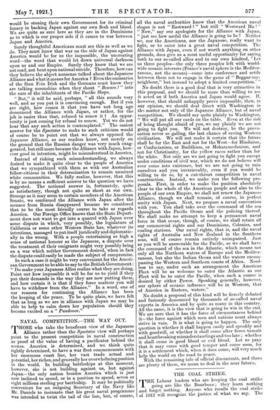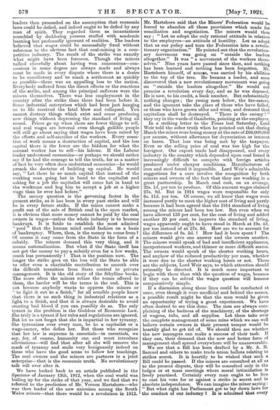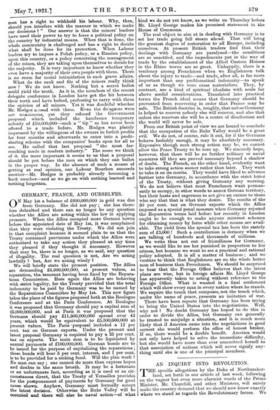THE COAL STRIKE. T HE Labour leaders who are keeping the
coal strike going are like the Bourbons ; they learn nothing and forget nothing. Anyone who recalls the coal strike of 1912 will recognize the justice of what we say. The leaders then proceeded on the assumption that economic laws could be defied, and indeed ought to be defied by any man of spirit. They regarded them as incantations mumbled, by doddering persons stuffed with academic learning but profoundly ignorant of realities. The leaders believed that wages could be successfully fixed without reference to the obvious fact that coal-mining is a com- petitive industry. The result of the strike was exactly what might have been foreseen. Though the miners talked cheerfully about having won concessions—con- cessions in some degree are always made and always must be made in every dispute where there is a desire to be conciliatory and to reach a settlement as quickly as possible—there was an appalling loss to the nation. Everybody suffered from the direct effects or the reactions of the strike, and among the principal sufferers were the miners themselves. 'There was less employment in the country after the strike than there had been before it. Some industrial enterprises which had been just hanging on to life received the fatal blow and collapsed. You cannot destroy things which exist and cease producing new things without depressing the standard of living all round. Prices go up when there are fewer things to sell, and real wages are lowered even though gullible people will still go about saying that wages have been raised by the efforts and sell-sacrifice of the workers. Every cessa- tion of work means a destruction of capital, and the less capital there is the fewer are the bidders for what the manual worker has to sell—his labour. If the Labour leader understood economics—or perhaps we should rather say if he had the courage to tell the truth, for as a matter of fact he very often does understand economies—he would preach the doctrine of building up capital. He would say, " Let there be so much capital that instead of the working man going hat in hand to the capitalist and asking for a job the capitalist will come hat in hand to the workman and beg him to accept a job at a higher wage than he ever had before." The money question is the governing factor in the present strike, as it has been in every past strike and will be in every future strike. If the mines cannot make a profit out of the sale of British coal in the open market, it is obvious that more money cannot be paid by the coal owners in wages—unless the whole industry is to become bankrupt. It is futile to establish the most admired " pool " that the human mind could fashion on a basis of bankruptcy. Where, then, is the money to come from / Of course it may come from the State in the form of a subsidy. The miners demand this very thing, and it means nationalization. But what if the State itself has not got the money to pay a subsidy even for a few weeks, much less permanently I That is the position now. The longer the strike goes on the less will the State be able to offer even a charitable contribution to smooth over the difficult transition from State control to private management. It is the old story of the Sibylline books. The more often the miners refuse the terms offered to them, the harder will be the terms in the end. This is not because anybody wants to oppress the miners or " to fight it out to a finish," for all sensible people know that there is no such thing in industrial relations as a fight to a finish, and that it is always desirable to avoid creating bad blood if you can possibly do so. The only tyrant in the problem is the Goddess of Economic Law. She truly is a tyrant if her rules and regulations are ignored. But let us not forget that she is impartial in her tyranny. She tyrannizes over every man, be he a capitalist or a wage-earner, who defies her. But those who recognize that her law is supreme in essentials—in essentials, we say, for, of course, humanity can and must introduce alleviations—will find that after all she will remove the mask of tyranny and smile very benignantly indeed on those who have the good sense to follow her teachings. The coal owners and the miners are partners in a joint enterprise—that is the economic truth. No revolutionary talk will ever alter it.
We have looked back to an article published in the Spectator of January 13th, 1912, when the coal world was boiling up for the strike of that year, and we find that we referred to the prediction of Mr. Vernon Hartshorn—who was then leader of the new unionism among the South Wales miners—that there would be a revolution in 1912. Mr. Hartshorn said that the )(mere' Federation would be forced to abandon all those provisions which made for conciliation and negotiation. The miners would then say : " Let us adopt the only rational attitude in relation to the employers—an attitude of hostility. Let us adopt that as our policy and turn the Federation into a. revolu- tionary organization." He pointed out that the revolution. ary movement was going on " outside the leaders altogether." It was " a movement of the workers them- selves." Nine years have passed since then, and nothing has been learned and nothing has been forgotten. Mr, Hartshorn himself, of course, was carried by his abilities to the top of the tree. He became a leader, and soon discovered that a new revolutionary movement was going on " outside the leaders altogether." He would not promise a revolution every day, and so he was deposed. He is now, to his credit, a back number. But substantially nothing changes ; the young men below, the fire-eaters, and the ignorant take the place of those who have failed, or those who have grown older and wiser, and demand that capitalism shall be destroyed. " There is the enemy ! " they cry in the words of Gambetta, pointing at the employer.
In a striking letter to the Times last Saturday, Lord Weir told the sober truth when he pointed out that during March the mines were losing money at the rate of £66,000,000 per annum, without allowance for depreciation or interest on loans. That loss was being met by the taxpayer. Even so the selling price of coal was too high for the foreigner. Our export trade had disappeared, and every industry in the country which depended upon coal found it increasingly difficult to compete with foreign articles produced under cheaper conditions. Manufacturers of iron and steel found it impossible. Lord Weir's admirable suggestions for a cure involve the recognition by both miners and owners of the fact that they are working in a great partnership. In March coal cost, on an average, 39s. ld. per ton to produce. Of this amount wages claimed 27s. 9d. But in 1914 wages were responsible for only 6s. 11d. per ton. Of course, we all know that wages were increased partly to meet the higher cost of living and partly because it had been agreed that the 1914 standard of living among the miners had been too low. But even when we have allowed 133 per cent. for the cost of living and added another 20 per cent. to improve the standard of living, wages apparently ought to have stood in March at 19s. 4d. per ton instead of at 27s. 9d. How are we to account for the difference of 8s. 5d. ? How had it been spent ? The miners would give one answer and the owners another. The miners would speak of bad and insufficient appliances, inexperienced workers, and thinner or more difficult seams. The owners would speak of the shorter working hours, and anyhow of the reduced productivity per man, whether it were due to the shorter working hours or not. These are the subjects, Lord Weir says, to which attention should primarily be directed. It is much more important to begin with them than with the question of wages, because if they can be solved the wages question will become comparatively simple. If a discussion along these lines could be conducted at once, even though it were unofficial and behind the scenes, a possible result might be that the men would be given an opportunity of trying a great experiment. We have often desired to see this done. The men are always com- plaining of the badness of the machinery, of the shortage of wagons, tubs, and all supplies. Let them take over the complete management of some mine which we can well believe certain owners in their present temper would be heartily glad to get rid of. We should then see whether the new managers can make a success of their task. If they can, their demand that the new and better form of management shall spread everywhere will be unanswerable. We see that a Bill has been drafted by a Mr. A. M. Samuel and others to make trade union ballots relating to strikes secret. It is heartily to be wished that such a Bill could be passed. If the miners are consulted at all as to the present dispute, they will be consulted only in the lodgea or at mass meetings where moral intimidation is freely practised. Certainly every man ought to be free to cast his vote for or against a strike in secret and in absolute independence. We can imagine the miner saying : " But what right has Parliament got to lay down laws for the conduct of our industry It is admitted that every man has a right to withhold his labour. Why, then, should you interfere with the manner in which we make our decisions ? " Our answer is that the miners' leaders have used their power to try to force a political policy on the country by industrial means. When that is done, the whole community is challenged and has a right to decide what shall be done for its protection. When Labour leaders try to impose a Polish policy, or a Russian policy, upon this country, or a policy concerning the management of the mines, they are taking upon themselves to decide for the majority. It is very important to know whether they even have a majority of their own people with them. There is no room for moral intimidation in such grave affairs. What do the rank and file of the miners really think now ? We do not know. Nothing but a secret ballot could yield the truth. As it is, the members of the recent delegate conference in London have got the bit between their teeth and have bolted, professing to carry with them the opinion of all miners. Yet it was doubtful whether Mr. Hodges azreed with them. Even the delegates were not unanimous, yet they refused the Government proposal which included the handsome temporary subsidy of £10,000,000-L'such a " tip " as has never been offered to a trade before. Mr. Hodges was plainly impressed by the willingness of the owners to forfeit profits for four months and afterwards to enter into a profit- sharing scheme with the companies' books open for all to see. He called that last proposal " the most far- reaching made in modern industry." The more we think of it. the more important it seems to us that a proposal should be put before the men on which they can ballot in the proper way. In the absence of such a means of getting at real opinion, one Labour Bourbon succeeds another—Mr. Hodges is probably already becoming a back number—and so we go on with nothing learned and nothing forgotten.




































 Previous page
Previous page